In ancient Rome, Stoicism grew amid a society focused on social hierarchies, political chaos, and religious rituals. You see it blend Greek philosophies with Roman values like duty, self-control, and resilience. As Rome faced civil wars and political upheavals, Stoicism offered guidance on inner peace and virtue. Its ideas spread through education, oratory, and key thinkers like Seneca and Marcus Aurelius. If you explore further, you’ll uncover how these beliefs shaped daily life and societal morals.
Key Takeaways
- Stoicism was integrated into Roman education and civic life, emphasizing virtue, self-control, and resilience aligned with societal values.
- Roman religious beliefs and myths reinforced Stoic ideals of divine order, natural law, and moral responsibility.
- Prominent Roman thinkers like Seneca, Epictetus, and Marcus Aurelius adapted Greek Stoic philosophy to Roman cultural norms.
- Stoic principles supported the societal focus on discipline, duty, and moderation amid political turmoil and social upheaval.
- Oratory and philosophical texts spread Stoic ideas, shaping personal conduct and influencing Roman views on virtue and cosmic harmony.
The Social Hierarchies and Class Structures of Rome

Ancient Rome’s social hierarchies and class structures were deeply ingrained in its political and daily life. As a Roman, you quickly learn that your status influences your opportunities, responsibilities, and interactions.
Your social status in Rome shapes your opportunities, duties, and daily interactions.
At the top, the patricians control wealth, power, and influence, shaping laws and policies. Below them, you find the plebeians, who make up most of the population, working as farmers, artisans, and laborers.
Slaves occupy the lowest tier, with little rights and often considered property. These distinctions define your social identity and determine your role within Roman society.
Even in everyday activities, your class influences your behavior, your access to education, and your participation in civic duties. Recognizing these hierarchies helps you understand the societal importance of virtues like discipline and duty.
Understanding social class also sheds light on how virtues such as discipline and duty were emphasized differently across various strata, reinforcing the social order.
Political Turmoil and the Rise of Imperial Authority
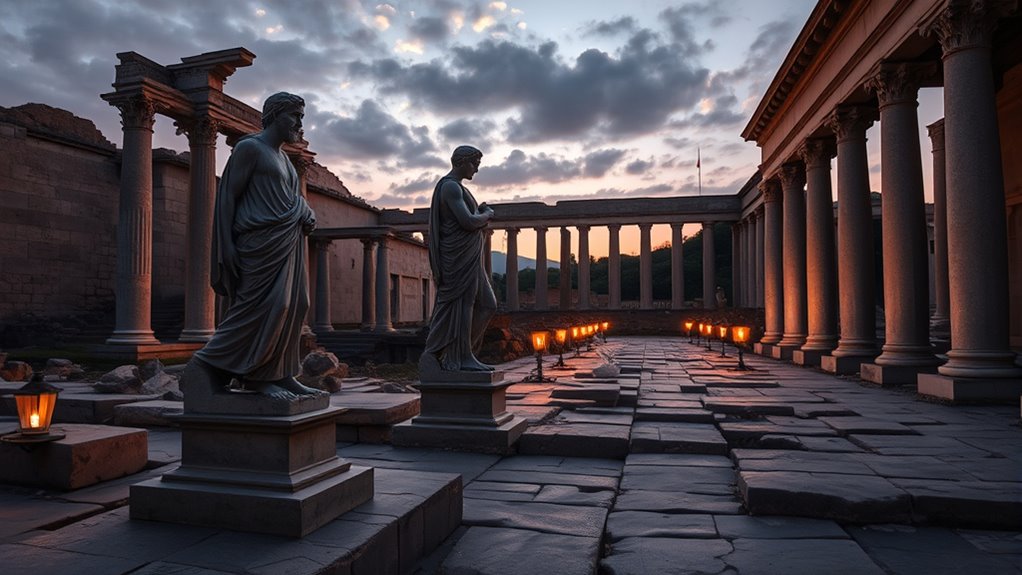
Political turmoil in Rome erupted repeatedly as power struggles among senators, generals, and ambitious politicians destabilized the republic. You witness the chaos as alliances shift, and leaders pursue personal gains at the expense of stability. These conflicts often led to civil wars, undermining Rome’s democratic institutions. The frequent upheavals also diminished public trust in traditional government structures, prompting a desire for more stable leadership. The breakdown of these institutions created a power vacuum that allowed strong individuals to seize control.
As chaos grew, many Romans began to seek order through stronger leadership. This environment paved the way for the rise of imperial authority, with figures like Julius Caesar and Augustus consolidating power. You see how the chaos eroded traditional republican values, making centralized control more appealing. The importance of legal and political structures became increasingly evident as stability was sought through authoritative rule. Additionally, the uncertainty intensified the public’s desire for stability, leading to widespread support for strong rulers who could restore order. Furthermore, the emergence of wealth and influence among key figures played a crucial role in shifting power dynamics during this period.
The shift from a republic to an empire wasn’t just political; it deeply affected Roman culture. Amid this turbulence, stoic principles offered a way to maintain personal virtue and resilience, even as the political landscape shifted dramatically.
Religious Beliefs and Their Influence on Philosophical Thought
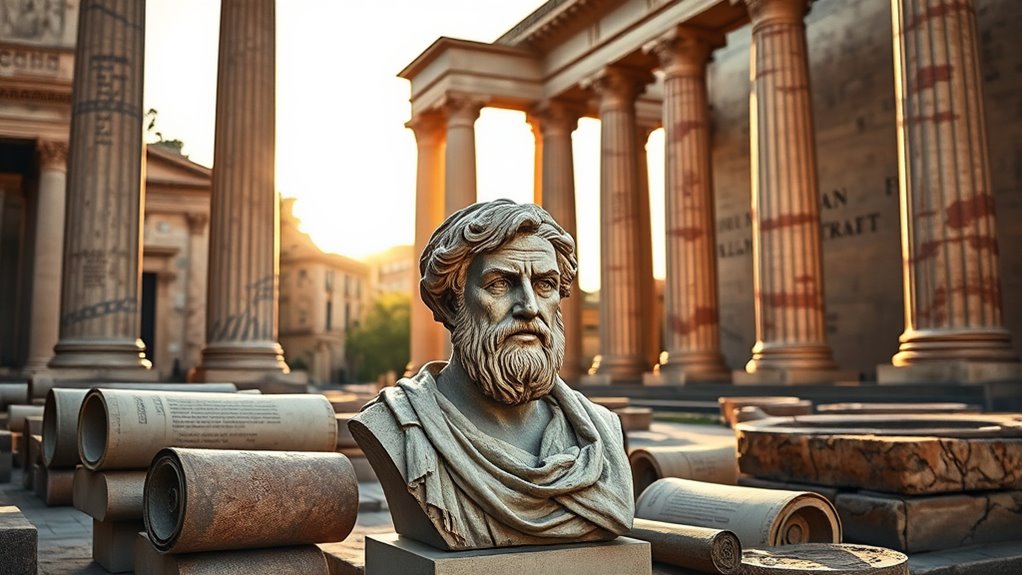
Your understanding of Roman religious practices reveals how they shaped philosophical ideas. The worship of specific deities and beliefs in divine intervention influenced Stoic concepts of nature and fate. Recognizing the role of polytheism helps you see how religion and philosophy intertwined in ancient Rome. Additionally, the use of unique and wicked planters in domestic spaces reflects the cultural significance of incorporating spiritual symbolism into daily life. This integration of religious symbolism into textile art demonstrates how cultural identity and spiritual beliefs permeated various aspects of Roman society. The presence of prophetic dreams in Roman culture further illustrates how divine messages were believed to influence personal and societal decisions, emphasizing the close connection between religion and philosophical thought. Moreover, understanding Cultural Intelligence can deepen your appreciation of how religious practices influenced social cohesion and collective identity in ancient Rome. The incorporation of traditional healing practices also highlights how spirituality and health were closely linked in Roman cultural contexts.
Roman Religious Practices
How did religious beliefs shape the philosophical landscape of Rome? You see, Roman religious practices emphasized rituals, civic duties, and honoring the gods through public ceremonies. These practices fostered a sense of community and reinforced social order, which philosophers like the Stoics appreciated. They believed that understanding the divine and maintaining piety helped individuals achieve virtue and harmony. Religious festivals and sacrifices weren’t just acts of devotion—they served as reminders of humans’ place within a larger cosmic order. This environment influenced philosophical thought by shaping ideas about duty, moral responsibility, and the pursuit of virtue. You’ll notice that many Roman thinkers integrated religious concepts into their ethics, seeing divine will as guiding principles for personal conduct and societal stability. Additionally, the integration of religious rituals into daily life reinforced the importance of aligning personal morality with societal expectations. The pervasive influence of religious beliefs also encouraged philosophers to consider the role of divine justice and providence in human affairs. Moreover, the emphasis on civic duties in religious observances helped to intertwine moral philosophy with public service and social cohesion.
Stoic Deities and Beliefs
Did the Stoics truly believe in divine beings, or were their deities more symbolic representations of natural forces? The Stoics viewed the universe as governed by a rational divine principle called Logos. They saw gods not as anthropomorphic beings but as expressions of the cosmic order. These deities embodied virtues and natural laws, guiding human conduct through reason. Additionally, the Stoic concept of divine rationality emphasizes their belief in a universal, intelligent force that pervades everything. This cosmic intelligence was considered the guiding principle behind natural events and moral virtues. The Stoics also believed that understanding this divine rationality could lead individuals to live in harmony with the universe and achieve inner tranquility. They thought that cultivating virtues was a way to align oneself with the divine order and attain moral excellence. Below is a simplified table illustrating their beliefs:
| Concept | Interpretation | Symbolic Meaning |
|---|---|---|
| Logos | Rational divine force | Universal reason |
| Zeus | Chief deity | Authority of natural law |
| Nature | Divine principle in everything | Source of harmony |
| Virtue | Divine ideal | Moral excellence |
| Fate | Deterministic force | Natural order |
This framework shaped their understanding of divine influence as an internal, rational force rather than external gods.
Influence of Polytheism
Polytheism deeply influenced Roman philosophical thought by shaping religious practices, cultural norms, and moral values. You see, the Roman gods exemplified virtues like justice, piety, and discipline, which philosophy often embraced. Religious rituals reinforced societal cohesion and moral standards, encouraging individuals to live harmoniously within the community. Philosophers, including Stoics, integrated these beliefs, viewing gods as rational forces guiding human behavior. The widespread worship of multiple deities also fostered an acceptance of diverse perspectives, promoting tolerance and adaptability in thought. This polytheistic environment made philosophical ideas more accessible and relatable, as they intertwined with daily life and religious duties. Additionally, the concept of a Gold IRA helped shape views on stability and security, mirroring the Roman emphasis on virtuous living and societal harmony. Moreover, the diversity of gods and their associated myths provided a rich mythological framework that influenced Roman storytelling and literary expression. The presence of divine intervention in myths reinforced the belief that the gods actively influenced human affairs, further integrating religion with philosophy. Religious rituals often served as a societal bonding mechanism, strengthening community ties and shared moral values. In this context, the religious rituals often served as a bridge between the divine and philosophical ideals, reinforcing societal values and individual virtues. Ultimately, polytheism provided a rich framework that influenced how Romans approached ethics, virtue, and their understanding of the divine.
Education, Oratory, and the Spread of Stoic Ideas
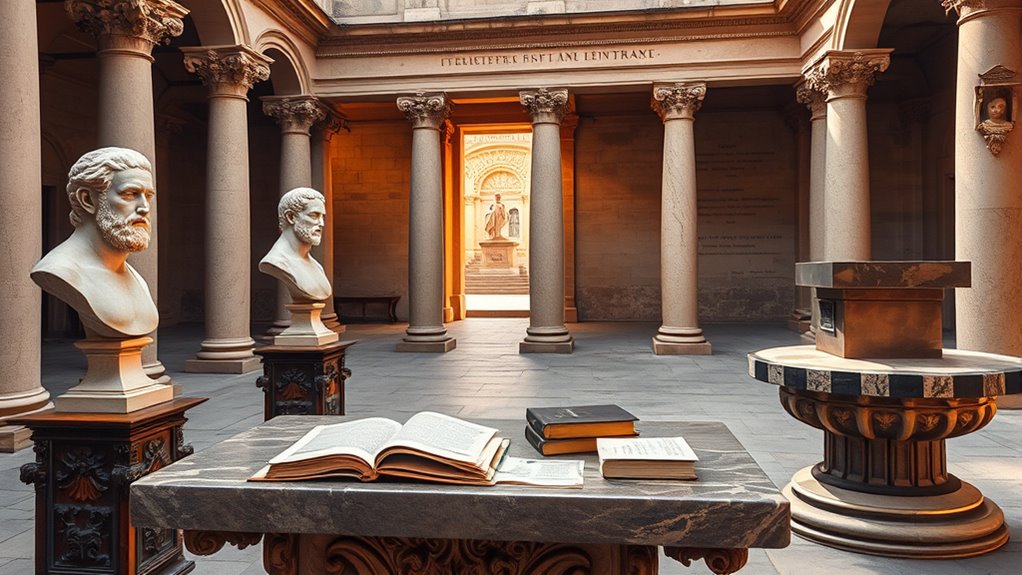
Your education shapes how Stoic ideas spread, emphasizing moral development and virtue.
Orators play a key role in inspiring others and making these philosophies accessible.
Together, they guarantee Stoicism remains influential throughout Roman society.
Education and Moral Development
Education and moral development in ancient Rome played a crucial role in shaping your character and philosophical outlooks, especially through the study of Stoicism. From a young age, you were encouraged to pursue moral excellence, self-discipline, and resilience.
Formal education emphasized not just memorization but also ethical reflection, guiding you to understand virtue as the highest good. Stoic teachers aimed to instill reason and emotional resilience, helping you to face life’s challenges calmly.
You learned that personal virtue was essential for social harmony and inner peace. This education fostered a sense of duty and self-control, shaping your worldview and moral compass.
As a result, Stoic ideals became deeply embedded in your personal development, influencing how you approached both everyday life and your role within society.
Oratory’s Role in Propagation
Oratory played a pivotal role in spreading Stoic ideas across ancient Rome, serving as a powerful tool for educators and philosophers to communicate their principles to a wider audience. Skilled speakers used rhetoric to make Stoic concepts relatable and memorable, inspiring listeners to adopt virtuous behavior. Public speeches, debates, and philosophical dialogues created a vibrant exchange that reinforced Stoic values in daily life. To illustrate, consider the following table highlighting key aspects of oratory’s influence:
| Technique | Purpose | Impact |
|---|---|---|
| Persuasive rhetoric | Engage and motivate audiences | Increased acceptance of Stoic ideas |
| Personal storytelling | Humanize philosophical concepts | Fostered emotional connection |
| Public debates | Clarify and challenge ideas | Strengthened philosophical discourse |
Daily Life and Cultural Values in Roman Society
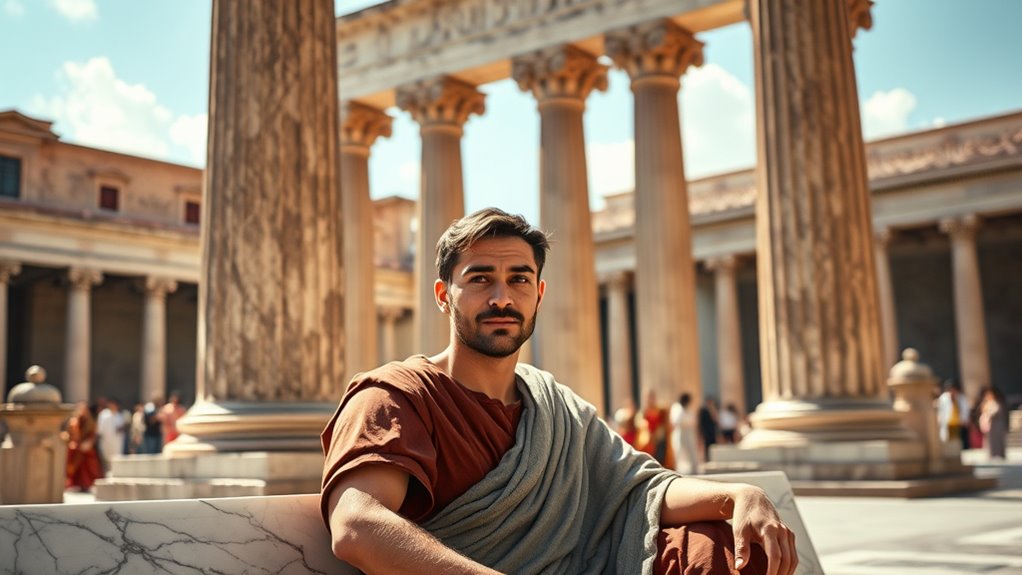
Daily life in Roman society was deeply shaped by its cultural values, emphasizing discipline, duty, and self-control. As a Roman citizen, you’re expected to prioritize public service, uphold family honor, and display restraint in your actions.
Education teaches you to value rhetoric, morality, and civic responsibility.
Social status influences your behavior; wealth and status come with responsibilities to lead by example.
Work and leisure are balanced through moderation, reflecting Stoic ideals.
You’re encouraged to accept your fate gracefully and avoid excessive emotional reactions.
Festivals, rituals, and daily routines reinforce community bonds and shared values.
Overall, your actions and attitudes mirror the Roman pursuit of virtue, stability, and harmony within society.
This cultural foundation shapes your identity and guides your interactions daily.
Interactions Between Greek and Roman Philosophical Traditions
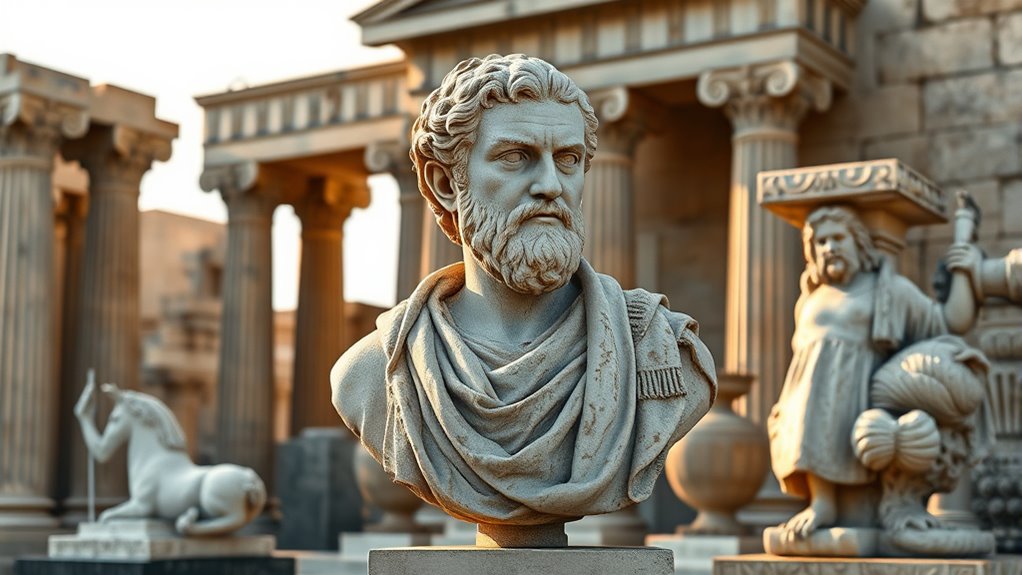
The rich cultural values of Roman society did not develop in isolation; instead, they were influenced by the philosophical ideas brought from Greece. Greek philosophy, especially Stoicism, deeply shaped Roman thought. Romans adapted Greek concepts to fit their social and political context, blending ideas like virtue and duty with their own values. This interaction created a dynamic exchange, enriching both traditions. Below is a table illustrating key influences:
| Greek Philosophy | Roman Adaptation | Notable Outcomes |
|---|---|---|
| Stoicism | Practical ethics | Focus on virtue in daily life |
| Epicureanism | Personal tranquility | Emphasis on moderation |
| Skepticism | Critical thinking | Questioning dogma |
| Platonism | Political philosophy | Ideas on justice |
This exchange allowed Roman thinkers to refine Greek ideas, making them more applicable to Roman society.
Key Figures and Their Contributions to Roman Stoicism
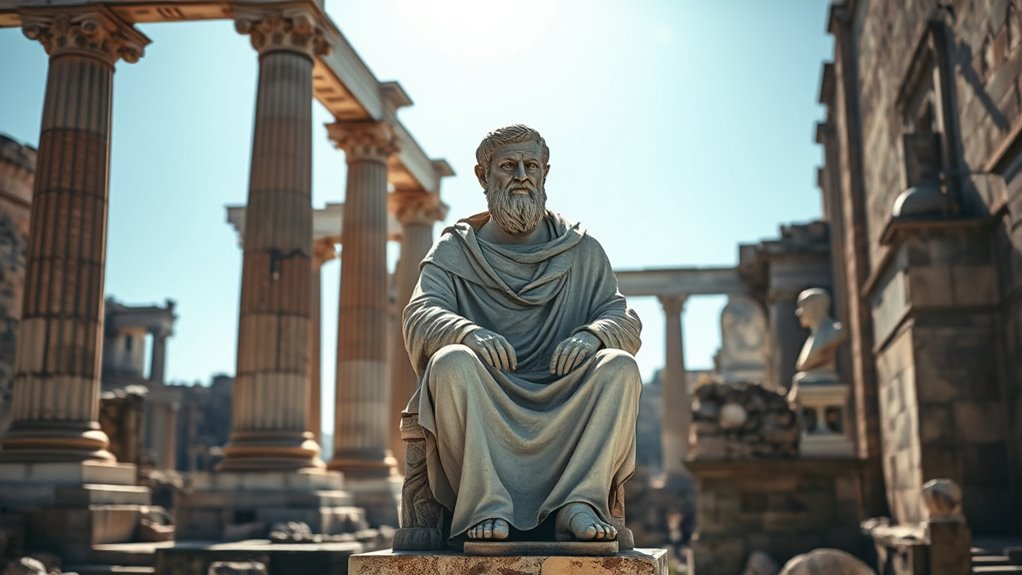
Several key figures shaped Roman Stoicism, each contributing unique insights that helped define the philosophy’s development.
Seneca, a statesman and playwright, emphasized practical ethics and self-control, urging you to focus on reason and virtue amid life’s challenges.
Epictetus, a former slave, taught that your happiness depends on your internal responses, not external circumstances, highlighting the importance of inner resilience.
Marcus Aurelius, a Roman emperor, practiced Stoic mindfulness in his “Meditations,” reminding you to accept fate and act justly.
These thinkers collectively emphasized self-discipline, rationality, and virtue as the path to tranquility.
Their writings continue to inspire you today to cultivate resilience, control your emotions, and live ethically, embodying the core principles of Roman Stoicism.
Frequently Asked Questions
How Did Stoicism Influence Roman Military Discipline and Leadership?
You can see that stoicism deeply influenced Roman military discipline and leadership by emphasizing self-control, resilience, and rational decision-making.
As a soldier or leader, practicing stoic virtues helps you stay calm under pressure, lead by example, and maintain focus on duty.
This philosophy encourages you to accept hardships with equanimity, fostering a disciplined and resilient army that values duty, honor, and perseverance in the face of adversity.
What Role Did Stoic Ethics Play in Roman Legal Practices?
You might think ethics are separate from law, but in Rome, Stoic ethics deeply influenced legal practices.
You see, Stoicism emphasizes justice, duty, and rationality, which shaped laws promoting fairness and moral responsibility.
As a result, Roman legal officials often based decisions on these principles, fostering a justice system rooted in virtue.
Were Women Involved in Stoic Philosophical Circles in Rome?
You might wonder if women participated in Roman Stoic circles. While most Stoic philosophers were men, some women, like Porcia Catonis and Musonius Rufus’s students, engaged with Stoic ideas.
Women attended philosophical discussions, and a few even authored writings. Although their involvement was limited compared to men’s, women still contributed considerably to Stoic thought, influencing its development in Roman society.
How Did Stoicism Adapt to Roman Societal Values Over Time?
Did you know that by the 2nd century AD, over 200 Stoic philosophers were active in Rome?
You see, Stoicism adapted to Roman societal values by emphasizing virtues like duty, self-control, and resilience, aligning with Roman ideals of discipline and service.
As society evolved, Stoics focused more on practical ethics, influencing public life and personal conduct, making the philosophy more accessible and relevant to everyday Roman citizens.
What Impact Did Stoicism Have on Roman Art and Literature?
You see that Stoicism deeply influences Roman art and literature by emphasizing virtue, resilience, and self-control. Artists and writers incorporate Stoic themes, portraying idealized virtues and heroic figures who embody inner strength.
Literature often reflects Stoic values through dialogues and reflections on morality, inspiring audiences to pursue wisdom and tranquility. This philosophical outlook shapes both the content and tone of Roman cultural works, leaving a lasting legacy in their creative expressions.
Conclusion
Understanding Rome’s social, political, and religious landscape helps you see how Stoicism thrived, guiding individuals through chaos and change. You can imagine how these ideas shaped daily life and moral values, influencing leaders and commoners alike. Isn’t it fascinating to think that amidst empire-building and upheaval, a philosophy emphasizing virtue and resilience offered a steady anchor? Stoicism’s enduring relevance reminds you that even today, ancient wisdom can help you navigate life’s challenges.









